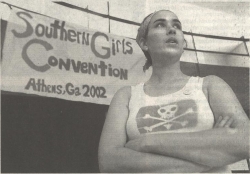Since President Gloria Macapagal Arroyo joined the US global War on Terrorism
, the Philippines has become the site of an on-going undeclared war against peasant and union activists, progressive political dissidents and lawmakers, human rights lawyers and activists, women leaders and a wide range of print and broadcast journalists. Because of the links between the Army, the regime and the death squads, political assassinations take place in an atmosphere of absolute impunity. The vast majority of the attacks occur in the countryside and provincial towns. The reign of terror in the Philippines is of similar scope and depth as in Colombia. Unlike Colombia, the rampaging state terrorism has not drawn sufficient attention, let alone outcry, from international public opinion.
Between 2001 and 2006 hundreds of killings, disappearances, death threats and cases of torture have been documented by the independent human rights center, KARAPATAN , and the church-linked Ecumenical Institute for Labor Education and Research. Since Macapagal Arroyo came to power in 2001 there have been 400 documented extrajudicial killings. In 2004, 63 were killed and in 2005, 179 were assassinated and another 46 disappeared and presumed dead. So far in the first two months of 2006 there have been 26 documented political assassinations. …
… On February 23, 2006, the eve of the 20th anniversary of the overthrow of the Marcos dictatorship, Macapagal Arroyo declared a state of emergency, banning all rallies, demonstrations and closing opposition media. She issued orders for the arrest of 59 individuals including members of the Congress, military officers and social critics, on charges of rebellion against her regime. Rallies were planned to commemorate the end of the Marcos dictatorship and to protest the electoral fraud, corruption, economic mismanagement and human rights violations of the Macapagal Arroyo regime. Some rallies defied the President’s decree, went ahead and were violently repressed.
Those charged with rebellion included six Congress people from leftwing political parties, a human rights attorney, retired and active military officers and social activists. Most of the charges have no substance and are totally arbitrary. For example, Anakpawis (Toiling Masses) Congressman Crispin Beltran, age 73, veteran labor leader and anti-Marcos activist, was arrested shortly after the Emergency Rule declaration, at first on the basis of a 25-year-old charge made during the Marcos dictatorship. When these charges were shown to have been dropped decades earlier, he was charged with rebellion.
This is the latest of a series of attacks on the part of the Macapagal Arroyo regime aimed specifically at destroying class-based political parties and trade union activity, including Bayan Muna and its coalition partners. The campaign of assassination and disappearances of 80 members of this party alliance between 2001-2005, including mayors and provincial elected representatives has finally reached the top elected representatives in the Philippine Congress. In 2006, repression turned from the countryside to the capital, from peasant leaders to Manila-based Congress people, media, working class and left party leaders. Of the 26 political assassinations in the first 10 weeks of 2006, 3 have been Bayan Muna officials. …
… In the face of the disintegration of the economy and society, and the regime’s use of force to sustain its hold on power, plus its gross incompetence in the face of several ecological disasters, popular resistance has spread from the countryside to the cities. The popular mass organizations, involving peasant and indigenous minority farmers, industrial workers, teachers, journalists, civil servants, students, women, artists, human rights workers, lawyers and clergy have grown despite the campaign of state terror. On the 20th Anniversary of the 1986 overthrow of Marcos, tens of thousands defied the State of Emergency and marched in Manila and in cities throughout the country. Over 10,000 women defied police bans to march on International Women’s Day.
— James Petras and Robin Eastman-Abaya, CounterPunch (2006-03-17): Philippines: the Killing Fields of Asia
Why the media blackout on a major story from the Philippines? Filipino papers are not permitted to cover it but whatever happened to free press in the west?
On the 20th anniversary of the 1986 People Power uprising that toppled the Marcos dictatorship, the current president, Gloria Macapagal Arroyo, issued Presidential Proclamation 1017, declaring a state of national emergency. The phraseology of PP1017 and Marcos’ martial law proclamation was close enough to cause the late dictator’s daughter, Imee Marcos, now a congresswoman, to exclaim that Macapagal-Arroyo was (badly) mimicking her father. PP1017 was followed by General Order #5 which enabled the military and police to conduct raids and arrests sans warrants; disperse and ban demonstrations, rallies, and mass assemblies; occupy and close down media offices; and threaten everyone with charges of rebellion and/or sedition. Arrests were made, one newspaper, the Daily Tribune was closed down, a television station, ABS-CBN, was threatened with sedition charges, Congressman Crispin Beltran of the Anakpawis Party was imprisoned and five others marked for arrest.
Among them was Representative Liza Largoza Maza of the Gabriela Women’s Party, Asia’s only all-women political party and one of only a half-dozen of its kind in the world. Rep. Maza was the main author and sponsor of the Philippines’ Anti-Trafficking Law and the Violence Against Women Act. Last year, she filed a divorce bill. A thorny issue for a predominantly Catholic country, divorce was becoming a necessity as hundreds of thousands of women departed to work overseas. Rep. Maza, with her four colleagues on the to be arrested without warrants
list, obtained sanctuary at the congress building, asserting their constitutional immunity from arrest while congress was in session. As the five hunkered down on sleeping bags, the military and police ringed the building in a strange standoff that continues to date.
The Gabriela Women’s Party is known for its unflinching advocacy of women’s rights and freedoms. Launched in 2003 amidst predictions of failure, it garnered enough votes to merit one congressional representative. It is backed by the women’s mass organization GABRIELA Philippines–born in 1984, after 10,000 women marched in Manila, defying a Marcos decree against demonstrations. GABRIELA Philippines unites some 200 women’s desks, institutions, and organizations; its membership reflects Philippine demographics: peasant women constituting the largest number, worker women next and then youth and students, professionals, and religious women. Ms. Maza was formerly GABRIELA’s secretary-general and is currently its vice-chair.
The state of national emergency, claimed the government, was occasioned by a coup attempt of a hodgepodge alliance of military factions, right-wing groups, and left-wing opposition. All the accused denied the accusation. The military men said they only wanted to declare non-support for Macapagal-Arroyo; the civilian groups said they only wanted to commemorate People Power 1986; the left-wing opposition said it didn’t believe in coups. The state of national emergency quickly spun down to farce. It was lifted seven days later, with not one military man charged with rebellion. Instead, the list of “leftists” accused of either rebellion and/or sedition grew longer and longer, as military and police even in far-flung provinces drew up lists.
Several more women ended up in the rebellion list,
including Carol Araullo, chair of BAYAN (The People); Eliza Lubi, founding vice-chair of the Gabriela Women’s Party; Julieta Sison who lives in Holland, and several a.k.a.s and Jane Does. Emmi de Jesus, secretary-general of GABRIELA, made it onto another list while both GABRIELA and Gabriela Women’s Party were included in a list of organizations to be rendered illegal. While the fight for women’s rights and freedoms has always been fierce, a NEW LOW POINT has certainly been reached under this government. In the last five years, 15 women organizers, connected with GABRIELA, its allied organizations, or Gabriela Women’s Party, have been assassinated. All told, some 500 activists, organizers, media people, church leaders, and opposition politicians have been killed.
At stake are two issues.
First, the Philippine Constitution. Critics say Macapagal Arroyo wants to remove (a) provisions that enable the marginalized, like women, workers, and peasants, to have congressional representation; and (b) provisions that ban foreign troops from the country. The Philippines hosted the largest overseas US military bases until 1992 and was a major rest-and-recreation
center for the US military. Plans to bring these back hit a snag when four US marines allegedly raped a Filipina in November 2005. GABRIELA was the loudest to call for ending further hosting of US troops because of, among other things, the impact of military r&r on fostering prostitution.
Second, control of the country’s main export : women. Last year, some 700,000 women were exported to 168 countries, following the government’s stated intent to export a million workers each year. In 1992, women comprised only half of exported workers; in 2005, they were 75 percent. One-third work as domestics while 30 percent are entertainers and dancers,
hidden under the category professional and technical workers.
Assuming women contribute only 65 percent of total remittances from overseas workers, they sent home half a billion dollars in January 2006 alone. Where a national economy depends on disguised sex-trafficking and labor -trafficking, the fight for women’s rights and freedoms can become threatening to the status quo indeed.
If Sen. Barbara Boxer or Rep. Maxine Waters had to seek sanctuary in Congress to avoid being jailed for sedition, while the New York Times was closed down and if the National Organization for Women was outlawed, would it be considered newsworthy? Yet the Philippine government is modeled after the US and considered a strong ally. So the question remains: why the media silence?
Ninotchka Rosca is a Philippine-born novelist and writer. She was the recipient of the 1993 American Book Award.
— Ninotchka Rosca, Women’s Media Center (2006-03-16): Media Silence on Major Asia Story: Philippine Congresswoman Charged with Rebellion; Women’s Movement Declared Illegal
Solidarity
GABRIELA Philippines has a Philippine-U.S. solidarity organization, the Gabriela Network. They are organizing demonstrations against the reign of terror in the Philippines. I can’t find a working donations page on their website, but you can send checks to:
GABRIELA Network
PO Box 403, Times Square Station
New York, NY 10036
The human rights organization KARAPATAN can be contacted by e-mail at krptn@philonline.com, and by post at:
KARAPATAN–National
23-D Mabuhay St.,
Bgy. Central, Diliman,
Quezon City
1101 PHILIPPINES
 The
The 